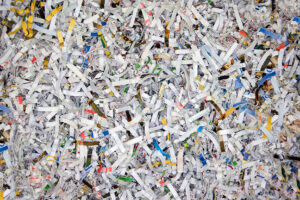Any business that generates medical waste is subject to federal, state, and local regulations. This applies to facilities such as doctor offices, dentist offices, veterinary clinics, and laboratories. How your staff handles and disposes of medical waste is your responsibility from “cradle to grave”: from the waste’s creation, all the way to when the waste is rendered non-hazardous.
In fact, you are still responsible even if you outsource the disposal of your waste. Meaning, if you hire a third party to haul away medical waste from your facility, you remain liable. Doctors and business owners can be sued by a municipality or even a member of the public should their waste show up in general waste landfills or any other place not permitted under regulation.
For example, perhaps your third party hauler is involved in a car accident while transporting your waste. That waste could end up all over the road, and even leak onto a nearby resident’s property. If that happens, then the resident could potentially sue the originators of the waste for endangerment.

The main medical waste violations that can cause your business or practice to be audited, fined, or sued include:
- Improper disposal
- Incorrect segmenting of medical waste vs regular trash
- Failure to register as a medical waste generator
- Improper labeling
- Criminal negligence
- Improper waste storage
- Third party haulers not being licensed
Any business handling medical waste could potentially be sued, from multinational corporations to small medical practices. It happens a lot more than you think. Let’s take a look at some case examples.
In 2017, a podiatry clinic in Missouri faced $93,074 in fines for the improper disposal of their medical waste, with the Occupational Safety and Health Administration (OSHA) cited them for 11 violations. The Anderson Foot and Ankle Clinic was charged with potentially exposing employees to infectious materials, and was cited for violating hazard communication standards.
In 2018, Target faced charges by the California District Attorney for the unlawful disposal of medical waste materials. They were fined $7.4 million. In 2011 they faced similar charges with a whopping $22.5 million dollars in fines. California Attorney General Havier Becerra hoped that the significant charges would push Target to make meaningful changes. He remarked on the case that “the wise move for all companies is to abide by the law and employ proactive training and processes to help ensure that hazardous waste violations are avoided in the first place.”
In 2015, a Texas A&M University System veterinary lab was found guilty of failing to register as a waste generator. While the lab correctly labeled, handled, and disposed of its medical waste, their crime was going over the limit set for non-registered entities.
In 2006, Rhode Island’s Department of Environment fined the Humane Association of Northwestern Rhode Island $3,000 for violating medical waste labeling regulations. Local police reported the crime after discovering unmarked garbage containing, among other things, used needles, syringes, and vaccine vials. The Humane Society was charged with failing to label medical waste properly, as well as failing to organize the legal transportation and tracking of that medical waste.
In 2010, a Pennsylvania dentist was fined $100,000 for dumping bags of syringes in local waters, which ended up washing up on New Jersey beaches. The dentist was found guilty of dumping 260 Accuject dental needles, 180 cotton swabs, and a number of blue and white plastic containers used to hold dental fillings. Had the dentist had a previous record, he would have faced up to a five year prison sentence for the crime as well.
In 2011, two San Diego hospitals were fined a combined $375,000 in civil penalties and costs for medical waste storage violations, failure to segment medical trash properly, and for not obtaining the proper transfer permits. Sharp Healthcare and Scripps Health issued statements following the action indicating they would increase surveillance of their trash to help avoid mistakes in future.
In 2014, a Massachusetts hospital was fined $6,000 by the Department of Environmental Protection for hiring an unlicensed third party hauler. When MassDEP inspected Cooley Dickinson Hospital, it also found that they failed to follow medical waste segregation rules, which help ensure the proper handling of the various types of hazardous medical waste. And that’s not all, as the hospital was also guilty of waste labeling violations.
Generators are forever liable for the medical waste they generate. This is why a lot of doctors and businesses that generate medical waste are using onsite treatment options, which helps render their medical waste safe to dispose of in the regular municipal trash. The option limits outside accidents or any potential waste hauler negligence, and thus helps doctors and business owners avoid the risk of litigation and even malpractice charges.










